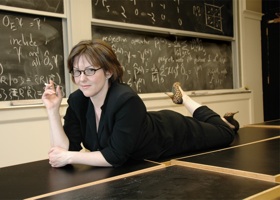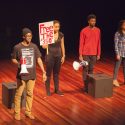Play to examine woman’s life in the male world of MIT math
Trust a good play to raise issues and spark debate.
Whether it’s William Shakespeare on loyalty, betrayal and revenge, or Athol Fugard on the ravages of race in South Africa, plays can take an audience to new places. And on Sept. 20 and 21, Madison audiences will have the chance to visit “MIT’s male math maze,” at performances of “Truth Values,” a one-woman play written and performed by Gioia De Cari.

Gioia De Cari wrote and performs the play “Truth Values.”
Photo: John Olson
De Cari earned the right to discuss the male-dominated world of MIT while a graduate student in the 1990s, but says she began the play “purely as an artistic exercise. I never intended to make a point, or have an agenda. It’s been surprising to me that the play has become a hit. People find it an appealing, novel way to have a conversation about the kind of issues that women continue to face in math, science, engineering and technology.”
The play was rooted in a journal De Cari started while at MIT in the 1990s. “I kept a journal for my own interest, and it had a lot of math stories. I did not intend to share it with anyone,” even though it seemed to have the makings of a good play.
Then, in 2005, Harvard University President Lawrence Summers shocked the academic world by declaring that women were being excluded from the top ranks of technical fields due to a “different availability of aptitude at the high end.”
Suddenly, De Cari realized that the nascent play needed to be finished. “This was something I should stand up and say. I had a pretty good script, why was I not sharing it? Summers was a very interesting muse for a feminist playwright,” she says with amusement.
The play, this year’s annual Denice D. Denton Distinguished Lecture, is co-sponsored by Women in Science and Engineering Leadership Institute, a UW–Madison program dedicated to promoting the participation and advancement of women in academic science and engineering.
“We are bringing ‘Truth Values’ to the UW–Madison community to open a conversation about the issues that continue to face women in the traditionally male cultures of science, math, and engineering,” says Jennifer Sheridan, executive director of WISELI.
“By all accounts,” Sheridan says, “the play not only illustrates the joy and satisfaction of a career in science and math, but also, through the use of humor and drama, the special issues that women can face in such environments. We hope this award-winning play opens eyes, encourages dialog, and initiates positive change across campus.”
Both performances will be followed by a panel discussion featuring UW–Madison experts interested in the issue of women in science. Vicki Bier, a professor of industrial engineering, will be among those panelists.
Bier recalls that while the late Denice Denton was at the College of Engineering between 1987 and 1996, she became a leader in advancing women in science, technology, engineering and mathematics.
“Even as an assistant professor, she felt empowered to have a say on the big issues on campus,” says Bier.
Denton went on to become chancellor of the University of California, Santa Cruz. Bier says she was very aware of the importance of women having good peer network.
“She made a difference: There are people all over the country who say, ‘I would not be doing what I am doing if I had not known Denice,'” Bier adds.
The performance is sponsored by the Denice Denton Memorial Fund, College of Engineering, College of Letters & Science, WISELI and the Women Faculty Mentoring Program/Irvine Fund.
Thursday, Sept. 20 will be free to UW–Madison faculty, staff and students (seats must be reserved at wiseli@engr.wisc.edu). Tickets for Friday, Sept. 21 ($10 for students and $15 general) are sold at the Mitchell Theater box office.

